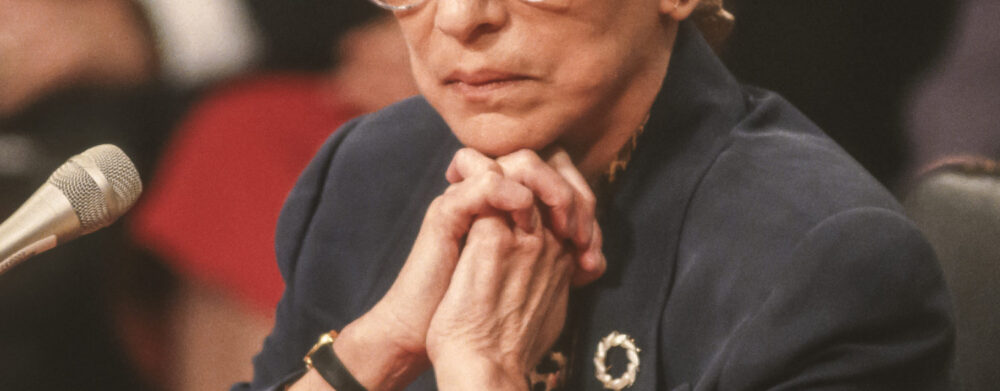This week the country mourns the loss of a true icon, U.S. Supreme Court Justice Ruth Bader Ginsburg. Affectionately known to her supporters as the “Notorious RBG,” Justice Ginsburg was a trailblazer who championed the rights of women and minorities. McOmber McOmber & Luber, P.C. is dedicated to fighting for you and is proud to pay tribute to Justice Ginsburg and her enduring legacy. Here are some highlights from her long career.
United States v. Virginia (1996)
This landmark decision was a huge victory for women’s rights and equality. In United States v. Virginia, the United States filed suit against the Virginia Military Institute (VMI), the country’s last remaining all male public undergraduate university. The government claimed that VMI’s male-only admissions policy violated the 14th Amendment’s Equal Protection Clause.
The U.S. Supreme Court agreed. Writing for the 7-1 majority, Justice Ginsburg stated “[g]eneralizations about ‘the way women are,’ estimates of what is appropriate for most women, no longer justify denying opportunity to women whose talent and capacity place them outside the average description.” www.supremecourt.gov.
This opinion was reflective of Justice Ginsburg’s lifelong commitment to women’s rights. In 1972, Ginsburg co-founded the Women’s Rights Project of the American Civil Liberties Union (ACLU) and spent her early legal career fighting against gender stereotypes and inequality. www.aclu.org.
Shelby County v. Holder (2013)
In this case, the U.S. Supreme Court struck down as unconstitutional a key provision of the Voting Rights Act of 1965.
This provision had to do with the requirement that the federal government review any changes to specific states’ election laws. These states, mostly in the South, were shown to have a history of voter suppression against African Americans. Some of these roadblocks included requiring literacy tests and arbitrarily changing polling places.
In its 5-4 ruling, the Court’s majority argued that the federal government no longer needed to review these states’ election laws because the Court believed that racial minorities no longer faced the same barriers to voting like they did in 1965.
In a stinging rebuke, Justice Ginsburg wrote “[t]hrowing out preclearance when it has worked and is continuing to work to stop discriminatory changes is like throwing away your umbrella in a rainstorm because you are not getting wet.” www.supremecourt.gov.
Ledbetter v. Goodyear Tire & Rubber Co. (2007)
Justice Ginsburg’s fight against race and gender discrimination was on full display in her fiery dissent in Ledbetter. In this 5-4 decision, the Court denied Lilly Ledbetter the right to sue her employer for gender-based pay discrimination.
Ledbetter, a retired 19-year Goodyear employee, sued the company for gender discrimination after she discovered that she had been paid less than her male counterparts. The Court dismissed her claim stating that she filed it too late. Under the Civil Rights Act of 1964, plaintiffs are required to file a claim of discrimination 180 days after an instance of discrimination. www.eeoc.gov.
In her strongly worded dissent, Justice Ginsburg explained that Ledbetter could not have filed her lawsuit any sooner because she wasn’t aware at the time of the years of discrimination.
“The Court’s insistence on immediate contest overlooks common characteristics of pay discrimination,” Ginsburg wrote. “Pay disparities often occur, as they did in Ledbetter’s case, in small increments; cause to suspect that discrimination is at work develops over time. Comparative pay information, moreover, is often hidden from the employee’s view.”
Justice Ginsburg used her dissent to call on Congress to pass legislation to overturn the Court’s decision. Congress acted on her words and in 2009, President Barack Obama signed the Lilly Ledbetter Fair Pay Act of 2009. www.congress.gov.
Obergefell v. Hodges (2015)
In this landmark decision, the U.S. Supreme Court granted same sex couples the right to marry in all 50 states. This was a huge victory for the LGBTQ movement who fought for years for the right to marry and be treated equally as heterosexual couples.
During oral argument, Justice Ginsburg rejected the notion that the Court had no right to challenge centuries of tradition. She stated, “[w]e have changed our ideas about marriage. Marriage today is not what it was under the common law tradition, under the civil law tradition.”
In response to an argument that the sole purpose of marriage is for procreation, Justice Ginsburg retorted, “Suppose a couple, a 70-year-old couple comes in and they want to get married. You don’t have to ask them any questions. You know they are not going to have any children.” www.supremecourt.gov.
Burwell v. Hobby Lobby (2014)
In Burwell v. Hobby Lobby, the U.S. Supreme Court ruled that companies could, on religious grounds, refuse to comply with the Affordable Care Act’s (ACA) mandate that health insurance plans cover birth control.
In her blistering dissent, Justice Ginsburg noted that the court had “ventured into a minefield” and asked, “[w]here is the stopping point. Suppose an employers’ sincerely held religious belief is offended by health coverage of vaccines, or paying the minimum wage, or according women equal pay for substantially similar work?”
Most recent in Little Sisters of the Poor v. Pennsylvania (2020), Justice Ginsburg would similarly rail against the Court’s decision to strike down the ACA’s mandate to cover contraception. “Today, for the first time, the Court casts totally aside countervailing rights and interests in its zeal to secure religious rights to the nth degree,” she wrote.
If you believe you have been discriminated on the job because of your race, gender or sexual orientation, that is a violation of state and federal law. The New Jersey discrimination lawyers at McOmber McOmber & Luber, P.C. are here to help. Please call our office in Red Bank, New Jersey at 732-842-6500, our Newark, New Jersey office at 973-878-9040, or our Marlton, New Jersey office at 856-985-9800.

